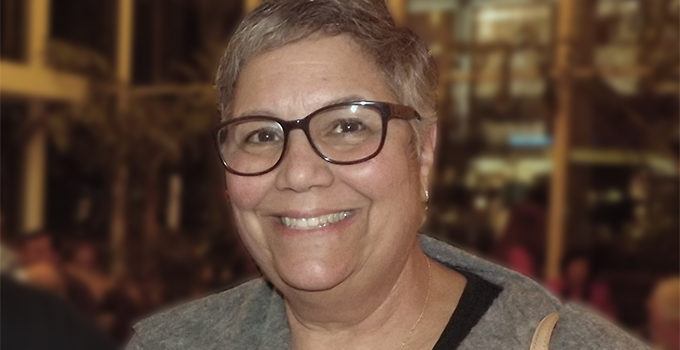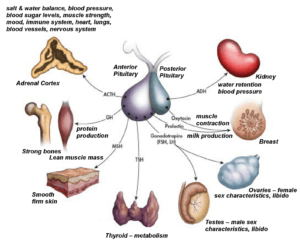

PATIENT STORY: Seeing Clearly After Pituitary Adenoma Surgery
by Sharmyn McGraw
There is a pea-sized structure at the base of the brain called the pituitary gland. It doesn’t look like much and it could be easy to overlook, but don’t underestimate the power of the pituitary gland. Small, yet mighty, this “master endocrine gland” is part of the endocrine system and produces critical hormones that affect a whole host of functions in the body. Hormones made by the pituitary help control growth, blood pressure, certain functions of the sex organs, thyroid glands and metabolism as well as some aspects of pregnancy, childbirth, nursing, water/salt concentration and the kidneys, temperature regulation and pain relief.

Pituitary adenomas are non-cancerous (benign), usually slow-growing tumors that develop on the pituitary gland and which cause various symptoms depending on the type of adenoma and whether there is an over- or under-production of hormones.
Tumor removal is most commonly performed by minimally invasive surgery using the transsphenoid approach (also called endoscopic endonasal approach). This involves accessing the brain via the nose and the sphenoid bone which is a butterfly-shaped bone at the base of the skull leading to the sphenoidal sinus cavity. Doctors insert the endoscope and surgical instruments through the nostril and are able to reach and extract the tumor causing minimal disturbance to surrounding brain tissues and structures.
One of our patients, Shelley, from Calabasas, California, shares her experience at the Pacific Neuroscience Institute’s Pacific Pituitary Disorders Center. In March 2014, she had a pituitary adenoma removed by endoscopic endonasal surgery.
* * * * *
“Almost two years ago, when I began this journey, I was losing my vision and I was ready to stop driving and quit my job because I could not see well enough. Then, I was diagnosed with a pituitary adenoma. The hardest part of the diagnosis was the ‘unrealness’ of it. It was very odd for me to think of something growing in my head that did not belong there. The idea of having surgery, and especially brain surgery, was very frightening to me. The only surgeries I had ever had before were C-sections when my children were born.
The best part of my journey was discovering and choosing the Pacific Pituitary Disorders Center. As I began to get referrals for a neurosurgeon, Dr. Daniel Kelly’s name was mentioned a number of times to me by a several physicians, including another neurosurgeon whom I saw initially.
When I first met Dr. Kelly, my husband and I were both very impressed with his incredible professionalism, knowledge and quiet warmth. Dr. Kelly was very patient and answered all my questions and concerns without ever making me feel rushed or unimportant. He is so committed to helping his patients and always shows concern, incredible patience and great skill. Drs. Kelly and Griffiths are so accessible and comforting in the way they deal with their patients. They helped to greatly lessen my fears. Everyone on the team was so helpful and caring, including nurse practitioner, Amy Eisenberg, all the doctors, nurses and office staff including Maricela Sandoval. They made my experience as easy and pleasant as possible.
My overall experience with the Pacific Pituitary Disorders Center at the Pacific Neuroscience Institute was extraordinary. My surgery went very well and my recovery went smoothly. I am so grateful to Drs. Kelly, Barkhoudarian and Griffiths and Dr. Kelly’s wonderful team. I have always felt great confidence in Dr. Kelly and I am very grateful for his kindness, skill and feel fortunate to be one of his patients. Dr. Kelly and his outstanding team at the Pacific Pituitary Disorders Center gave me back my vision and enabled me to continue to be actively involved in my family, my work and all aspects of my life.”
Thank you Shelley, for sharing your story.
About the Author

Sharmyn McGraw
Sharmyn McGraw is a patient advocate, charismatic professional speaker and published author. She has first-hand experience as a Cushing’s disease survivor and often collaborates with nationally-recognized neuro-endocrine experts, sharing the speaker’s platform while educating patients and doctors about neuroendocrine hormonal disorders and their impact on our health as a nation. Sharmyn facilitates the largest pituitary patient support group in the country for the Pacific Neuroscience Institute.
Last updated: April 2nd, 2020